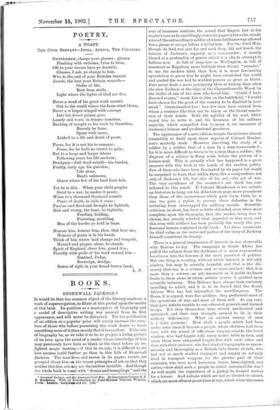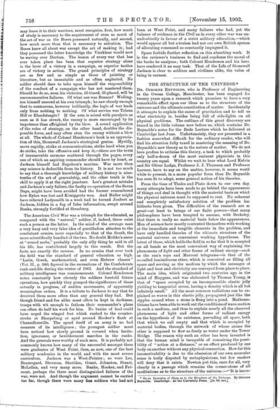BOOKS.
STONEWALL JACKSON.*
IT would be that too common object of the literary seashore, a work of supererogation, to dilate at this period upon the merits of this book. Its position as a masterpiece of biography and a model of descriptive writing was assured from its first appearance, and will never be disturbed. Yet the publication of an edition at a popular price will surely increase the num- bers of those who before possessing the work desire to know something more of it than merely that it is excellent. If the aim of biography be, as we take it to be, to project a living picture of its hero upon the mind of a reader whose knowledge of him may previously have been as blank as the sheet before an un- lighted magic lantern,—if this be its aim, it is difficult to see how success could farther go than in this Life of Stonewall Jackson. The man lives and moves in its pages; events are grouped about him on the truest principles of art, so that they neither blot him out nor are themselves invisible. And though the whole book is vocal with " drums and tramplings " and the • Stonewall Jackson, and the American Civil War. By Lieutenant-Colonel G. F. B. Henderson. With an Introduction by Field-Marshal Viscount Wolaeley. vols. London : Longways and Co. [161.1 roar of immense combats, the sound that lingers last in the reader's ears as he unwillingly closes its pages is the calm, steady voice of the extraordinary soldier of whose brilliance war allowed but a gleam to escape before it killed him. For the Civil War, though its lead was cast far and sank deep, did not touch the bottom of Jackson's capacity as a commander; it merely hinted at a profundity of genius which it is idle to attempt to fathom now. As full of surprises as Wellington, as full of resources as Napoleon, more brilliant than Grant, " sounder," to use the modern label, than Lee, it is mere fascinating speculation to guess how he might have astonished the world and guided the war had he wielded powers as great as theirs. Fate never dealt a more paralysing blow at history than when she slew Jackson at the edge of the Chancellorsville Wood by the bullet of one of the men who loved him. " Could I have directed events," wrote Lee to him on the battlefield, " I would have chosen for the good of the country to be disabled in your stead." Great-hearted Lee ! how few men have existed from whom a sentence like that can be taken as the literal conclu- sion of their minds. Both the nqbility of his soul, which urged hint to write it, and the keenness of his military sagacity, which compelled him to mean it, are measures of Jackson's human and professional greatness.
The appearance of a new edition tempts the reviewer almost irresistibly to dwell upon these aspects of Colonel Hender- son's masterly work. However absorbing the study of a soldier by a soldier, that of a man by a man transcends it ; for it is more difficult to learn to be a man than a soldier ; the diagram of a science is flung aside before the picture of a human soul. This is actually what has happened in a great measure with this book at the hands of the reading public. Few of those who have been fascinated by its pages but would be surprised to learn that within them lies a compendium not only of Jackson's life, but also of his art,—the art of war. The very excellence of the narrator's art itself has con- tributed to this result. If Colonel Henderson is too artistic an historian to hang out his didactics on pegs more prominent than those of the occurrences which gave them birth, he is also too pure a stylist to present these didactics in the irritating form stereotyped for military morals. Scientific criticism, in short, has been so little obtruded, even when most complete, upon the biography, that the reader, being free to choose, has usually selected what appealed to him most, and this even with soldiers has been probably but rarely the pro- fessional lessons contained in the book. Yet these constitute its chief value, as the verve and pathos of the story of Jackson himself constitute its beauty.
There is a general renaissance of interest in war observable with Britons to-day. The campaign in South Africa has pulled the subject from the doldrums of a mere argument ant baculinum into the breezes of the most practical of politics. But one thing is wanting, without which interest is not only aimless, but may be actually harmful, and that is the dis- covery that war is a science and no mere instinct; that it is more than a science, an art, insomuch as it yields its finest fruits to them alone hr whom artistic genius is grafted upon scientific industry. This Britons have always been curiously unwilling to admit, and it is to be feared that the South African War has but intensified the unwillingness. The Boers, it is argued, were fine soldiers ; they performed most of the operations of war, and most of them well. At any rate, they gave infinite trouble to our educated generals and trained troops. Yet they themselves were utterly uneducated and untrained, and their very strength seemed to lie in their military deficiencies. What an ancient enemy of man is a false premise ! How shall a people which had been under arms since it became a people, whose children had been born with the sound of rifle-shots ringing outside the hovel window, who had fought with every native tribe in turn, and when these were exhausted fought first with each other and then with their saviours, who had studied topography as uncon- sciously and thoroughly as a British babe learns to talk, who bad not so much studied transport and supply as actually lived in transport waggons for the greater part of their existence, who were good horsemen, brave, keen-sighted, and active,—how shall such a people be called untrained for war ? As well might the experience of a jockey be deemed .useless for a hussar. And nations which are not so blessed or cursed, which are more often at peace than at war, which when war comes may leave it to their warriors, must recognise, first, how much of study is necessary to the acquirement of even as much of the art of war as the Boers possessed naturally, and second, how much more than that is necessary to salvation. The Boers knew all about war except the art of making it ; had they possessed the latter knowledge the Vierkleur would now be waving over Durban. The lesson of every war that has ever taken place has been that superior strategy alone is the lever of a victory in a campaign, as superior tactics are of victory in action. The grand principles of strategy are as few and as simple as those of painting or literature, but as immutable and as often neglected. No soldier should dare to take upon himself the responsibility of the conduct of a campaign who has not mastered them. Should he do so, even his victories, ill-timed, ill-placed, will be unremunerative failures. Of what use was Busaco? Welling- ton himself sneered at his own triumph; he saw clearly enough that to contravene, however brilliantly, the logic of war leads only from nothing to nothing. Of what service was Talana Hill or Elandslaagte ? If the arm is seized with paralysis as soon as it has struck, the enemy is more encouraged by its impotence than affrighted by the blow. A sound application of the rules of strategy, on the other hand, doubles the dis- posable force, and may often stun the enemy without a blow at all. The whole of Colonel Henderson's book is an apprecia- tion of this, Stonewall Jackson's strategical genius. Mystify, move rapidly, strike at communications, strike hard when you do strike, take the offensive and keep it,—these are the texts of innumerable sermons scattered through the pages, every one of which an aspiring commander should have by heart, as Jackson himself had Napoleon's maxims. War more than any science is deducible from its history. It is not too much to say that a thorough knowledge of military history is nine- tenths of the art of generalship, and the other tenth is the skill to apply it at the right juncture. Lee's greatest mistake and Jackson's only failure, the faulty co-operation of the Seven Days, might have been avoided had the former remembered how Eylau was lost and Koniggratz won. And Buller might have relieved Ladysmith in a week had he turned Joubert as Jackson, hidden in a fog of false information, swept around Banks, strongly fortified at Strasburg.
The American Civil War was a triumph for the educated, as compared with the " natural," soldier, if, indeed, there exist such a person as the latter. In the mind of the average man a very hazy and very false idea of guerilladom attaches to the combatant armies, more especially to that of the South, the more scientifically handled of the two. No doubt Moltke's sneer at "armed mobs," probably the only silly thing he said in all his life, has contributed largely to this result. But the facts are exactly the reverse. In no armies that ever took the field was the standard of general education so high. " Latin, Greek, mathematical, and even Hebrew classes " (Vol. II., p. 348) figured in the recreations of the Confederate rank-and-file during the winter of 1863. And the standard of military intelligence was commensurate. Colonel Henderson notes constantly how cleverly the soldiers foretold future operations, how quickly they grasped the significance of those actually in progress, of sudden movements, of apparently meaningless orders. It is a tribute to Jackson to say that he deceived them more often than any general they had. But though friend and foe alike must often be kept in darkness, troops with wit enough to fathom their commander's plans can often do half his work for him. No brains of lead could have urged the winged feet which rushed to the counter- stroke at Sharpsburg or sped around Hooker's flank at Chanoelloraville. The speed itself of an army is no bad measure of its intelligence ; the youngest soldier must have noticed how slowly ground is covered when hesita- tion, ignorance, or bewilderment marches in the ranks. And the generals were worthy of such men. It is probably not commonly known how many of the successful amongst them were graduates of West Point, then, as now, one of the best military academies in the world, and with the most severe curriculum. Jackson was a West-Pointer ; so were Lee, Beauregard, Sherman, Sheridan, Grant, Johnston, Stuart, McLellan, and very many more. Banks, Hooker, and Fre- mont, perhaps the three most distinguished failures of the war, were not. And though the argument cannot be carried
too far, though there were many fine soldiers who had not - Reyna:
been at West Point, and many failures who had, yet the balance of evidence in the Civil 'as in every other war was un- undoubtedly in favour of a strict military education,—which would appear all but a truism had not our own British system of allocating command so constantly impugned it..
Space forbids further reflection on this absorbing work. It is the reviewer's business to find and condense the moral of the books he analyses; both Colonel Henderson and his hero have rendered it an easy task. That of the Life of Stonewall Jackson is clear to soldiers and civilians alike, the value of being in earnest.























































 Previous page
Previous page